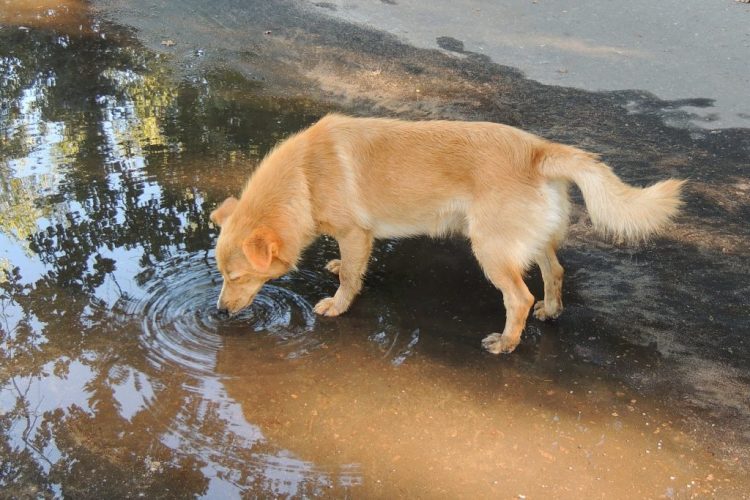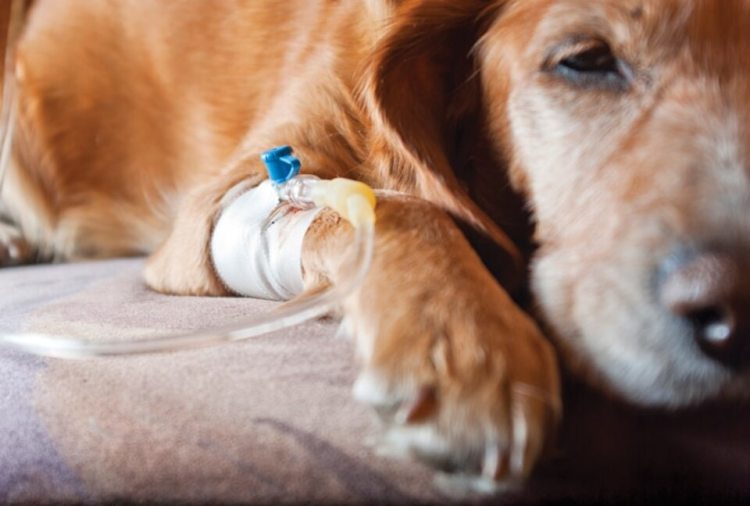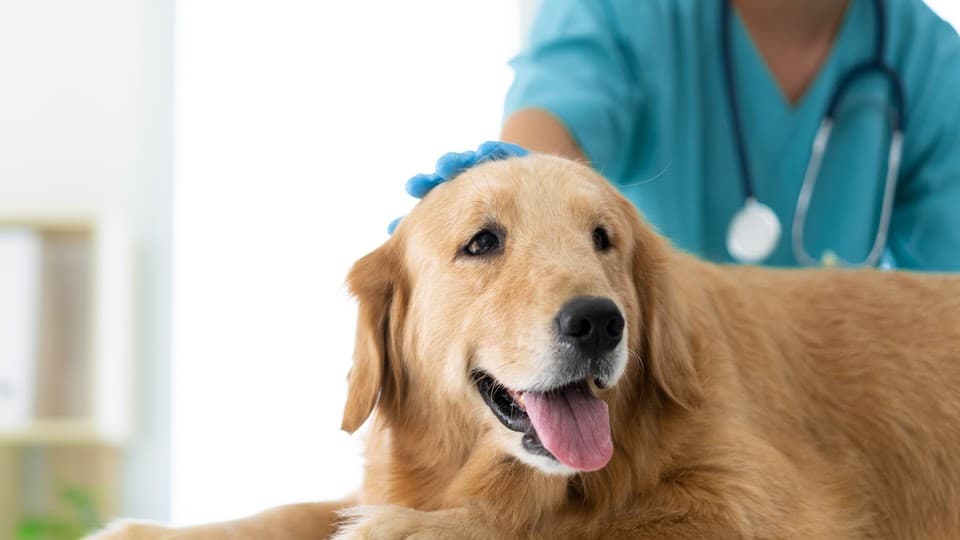Leptospirosis is a disease caused by the bacteria called Leptospira, which are passed through the urine and can survive for a long time in moist soil or stagnant water. The disease causes damage to vital organs, such as the liver and kidneys, and is often fatal.
Pro Tip: Dog insurance does cover leptospirosis treatment costs if your pet is enrolled before an infection. Pet health insurance does not cover pre-existing conditions, so it’s important to enroll before any issues arise.
Risk Factors for Leptospirosis
The leptospirosis bacteria are found worldwide in water and soil but are more common in areas with high annual rainfall and warm climates.
The bacteria can enter the body through the nose, mouth, scratches, and wounds. Dogs can get infected by:
- Being exposed or drinking water from lakes, streams, and rivers;
- Roaming or living on farm properties because of possible exposure to infected farm animals, water sources, and wildlife;
- Exposure to farm animals and wild animals such as raccoons, skunks, opossums, deer, and wolves, as well as contact with other infected dogs or rodents.
- The disease can also be passed through the placenta from the mother dog to the little puppies.
Are Humans at Risk? Leptospirosis is a zoonotic disease, which means that it can be transmitted from animals to humans. Leptospirosis in people is a serious disease also known as Weil’s disease. It can cause flu-like symptoms, as well as vomiting, conjunctivitis, diarrhea, cough, stomach pain, and jaundice. Only about 10% of people develop severe symptoms, including liver or kidney failure, difficulty breathing, meningitis, and bleeding.
In the US, there are about 100 to 150 cases of human leptospirosis reported annually. However, the majority of the cases of human leptospirosis in the States are a result of recreational activities involving water. Infection resulting from contact with an infected dog is possible but quite rare.
Symptoms of Leptospirosis in Dogs
The symptoms of leptospirosis in dogs often vary. Some pups don’t show any signs of illness, while others have mild symptoms that go away with minimal to no treatment. In fact, one study found that 25% of healthy unvaccinated dogs had antibodies to leptospirosis, which indicates that they had been exposed to the disease without their owners noticing any symptoms.
However, when leptospirosis does cause an illness in pups, it tends to be more severe in unvaccinated pets younger than six months of age. In these cases, the illness usually develops quickly (it takes about 4 to 12 days after exposure for a pup to start feeling ill) and is often fatal. It can also cause disease in dogs of any age and can be very severe and difficult to treat.
Symptoms of leptospirosis include:
- Fever
- Muscle tenderness, pain, and limping
- Loss of appetite
- Weakness
- Increased thirst
- Vomiting
- Dehydration
- Changes in the amount and frequency of urination
- Bloody diarrhea
- Bleeding from the eyes and mouth
- Painful eye inflammation
- Difficulty breathing
- Mouth ulcers
- Jaundice (yellowing of the skin and mucous membranes)
- Swollen legs
- Accumulation of fluid in the chest or abdomen
- Lethargy
- Reluctance to move
- Depression
- Kidney and liver failure
 (Image source: Arlington Animal Hospital)
(Image source: Arlington Animal Hospital)
Diagnosing Leptospirosis
Leptospirosis may be suspected based on the symptoms and exposure history, but many of the clinical signs can easily be confused with other diseases. Besides a physical examination, your vet might recommend several other tests such as bloodwork, an ultrasound, and an x-ray.
Routine blood tests (CBC, serum biochemistry, and urinalysis) don’t provide a definitive diagnosis but they do give clues, which means that they’re the best starting point for diagnosing leptospirosis. If routine tests suggest that an animal is infected with the disease, additional testing will be necessary in order to confirm the diagnosis.
The two most common tests used to confirm leptospirosis are:
-
DNA-PCR- a test that detects the DNA of the disease in the urine or blood. A urine sample is usually preferred because of the big number of bacteria present. The test must be conducted before the animal is administered antibiotics as the leptospira bacteria are easily killed by these medications. DNA-PCR is most accurate in the early stages of more severe cases when a big number of bacteria are present. Pets that only have mild symptoms or have been sick for a longer time might be hard to diagnose using this test.
-
Microscopic agglutination test (MAT) is a test that detects the presence of leptospira antibodies in the bloodstream. If the level of antibodies is high, infection is confirmed. The MAT test is slower than DNA-PCR (can take about 2 weeks) and sometimes requires a follow-up test in order to confirm the presence of infection. In addition, if the dog was given antibiotics earlier in the course of the disease or it has been vaccinated for leptospirosis, the results can be inconclusive.
How to Treat Leptospirosis in Dogs
Antibiotics are usually effective in treating leptospirosis, and most pups respond quickly once therapy is started. When treated aggressively and on time, the chances for recovery are quite good but there’s still a risk of permanent residual liver or kidney damage. Special care must be taken by owners to not contract the disease while caring for their pets. This included isolating your pet as well as where protective equipment such as gloves and gowns.
Pups with severe liver or kidney damage might also require hospitalization for intravenous fluids, anti-nausea medications, and careful monitoring. The prognosis for severely infected pets is fair - depending on the case series, 50% - 90% of animals can be discharged from the hospital after a stay of up to 10 days. However, it should be noted that severe infection usually causes significant organ damage, causing rapid deterioration and even death despite appropriate treatment.
Sadly, if your furry companion becomes seriously ill with leptospirosis, you might have to consider putting him to sleep.
 (Image source: Today’s Veterinary Practice)
(Image source: Today’s Veterinary Practice)
Leptospirosis Treatment Cost (and Savings)
Pets with leptospirosis can be quite sick and treatment can be very expensive. On average, it costs about $2,000 to diagnose and treat a case of leptospirosis in dogs. This price can increase significantly if your pet's disease is more severe.
Pet insurance is a savings tool that every pet owner should consider to drastically reduce veterinary expenses. As long as you enroll before any illnesses or injuries arise, the insurance policy can reimburse you up to 90% of any unexpected vet bills.
How to Prevent Leptospirosis in Dogs
Vaccination and reducing your pet’s exposure to possible sources of the leptospira bacteria is the best way to reduce the chances of infection.
Animals with leptospirosis need to be treated in isolation in order to prevent them from spreading it to their owners, other pets, or hospital employees.
Even after recovery, your pet can keep spreading the leptospirosis bacteria through its urine and remain a risk to people and other pets for some time.
Vaccination
The American Animal Hospital Association (AAHA) considers leptospirosis a “non-core” vaccine for dogs, i.e. it is not highly recommended unless your pet is at high risk of contracting the disease or you live in a high risk area. That being said, many owners consider vaccinating their pets for leptospirosis just to be safe.
In some areas the leptospirosis vaccine is considered core by many vet hospitals due to increased risk in that particular area. It is recommended that you check with your veterinarian to see if it is needed in the area you live.
There are several different types of leptospirosis bacteria and there are different vaccines on the market to cover for the various strains. Most veterinarians use a vaccine to cover for the most common strains of the bacteria. It is important to note that your pet could contract a different stain of the disease that they are not vaccinated for. Currently available vaccines effectively protect dogs against the included strains for at least one year and even though they don’t always prevent infection, they tend to make the disease milder in case infection occurs.
Make sure to discuss the vaccine for Leptospirosis with your vet. The decision about the vaccine will be based on yours and your dog’s lifestyle and whether your community has had experiences with the disease.
Some dogs experience mild side effects following vaccination, such as lethargy and loss of appetite. Rarely an anaphylactic shock-like reaction can occur shortly after vaccination. However, vaccine reactions can be controlled medically, so be sure to call your vet if you have any concerns.
What can people do to prevent leptospirosis
As we mentioned earlier, an infected pet presents a low risk of infection for pet owners and veterinary staff, but there’s still some risk.
If your furry pal has been diagnosed with the disease, be sure to take the following precaution measures:
- Avoid touching or handling any blood or urine from your infected dog before it has received treatment for the disease.
- If your pet urinates inside your home, clean the area using an antibacterial cleaning solution or a solution of one part household bleach in ten parts water.
- If you must have contact with blood or urine, make sure to wear protective equipment, such as boots, face mask, and gloves, especially if you’re occupationally at risk (vets and farm workers).
- Encourage your pet to urinate away from areas where other animals or people will have access or from standing water;
- Wash your hands every time after handling your dog or anything that could have its excrement on it.
- Administer medicines following your vet’s instructions;
If you’re feeling unwell after exposure to an infected animal, be sure to seek medical attention. If you’re immunocompromised (due to cancer treatment, medications, or certain medical conditions) or pregnant, consult with your physician.
Main Takeaways
- All dogs are at risk of contracting leptospirosis, which is a very serious and potentially fatal infection.
- Leptospirosis can be subtle, showing no symptoms at all. If symptoms do occur, it can cause severe illness and even kidney or liver failure.
- If you notice any of the leptospirosis symptoms (fever, loss of appetite, lethargy, etc.), make sure to contact your vet immediately. Early detection and treatment are crucial for giving your pet the best prognosis possible.
- In addition, talk to your vet about leptospirosis vaccination and think about how you can reduce your dog’s exposure to possible sources of the leptospira bacteria.
- The disease can be treated with antibiotics and the risk of infection of others in your household can be reduced by taking the necessary precautions.
- Enroll in pet insurance before your pet contracts this disease to have up to 90% of the veterinary costs reimbursed.
